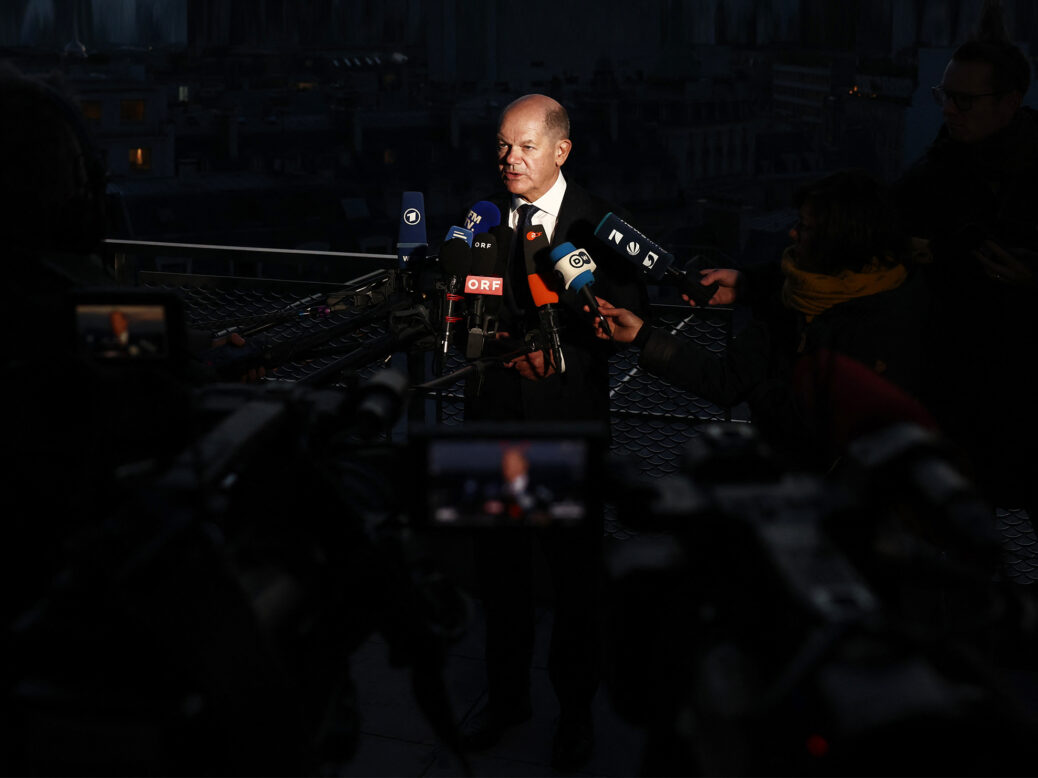
The collapse of support for the mainstream centre-left in Western democracies is accelerating with the abject defeat of Olaf Scholz’s Social Democrats (SPD) in the German federal elections. The Christian Democrat-led conservative bloc returned to power under Friedrich Merz. The Alternative for Germany (AfD), the most successful far-right movement in the country since the Second World War, will become the official opposition in the Bundestag. One cannot exaggerate how shocking this outcome is for German liberals. No established party will enter coalition with the far right – a political firewall (Brandmauer) separates the mainstream from extremists – but Merz is taking his lead from the AfD. He has toughened his rhetoric on immigration and his approach markedly contrasts with Angela Merkel’s liberal centrism, the politics of a dead era. The AfD’s surge is, Merz said after the election, the “last warning”.
The AfD, ludicrously backed on social media by Elon Musk, first emerged as a kind of EU-sceptic pressure group set up by dissident academics before evolving into something far darker and nastier, with particularly strong support in the east. It won 20.8 per cent of the vote on 23 February (a rise of more than 10 per cent from three years ago). In a post-election speech, the AfD leader Alice Weidel said her party’s hand would “always be outstretched for government participation to implement the will of the people”. She is now calling the AfD “the people’s party”, a familiar populist trope. But which people and whose will?
On a visit to Berlin in February 2023, I went to see Wolfgang Schmidt, Scholz’s long-time confidant and de facto chief of staff, in his grand office at the Chancellery. As we talked late into the night, my eye was engaged by the large Gerhard Richter paintings on the walls behind him. I listened as he explained why the centre left was not in long-term decline and why Scholz, who trained as a lawyer, was the ideal politician for these times. The line I kept hearing during my visit was that he was “Angela Merkel but with a plan”. I was not convinced. During the 2017 election campaign, after which he became Merkel’s deputy in the grand coalition, Scholz had rejected the Nato imperative to spend at least 2 per cent of national income on defence as “nonsensical and lacking parliamentary legitimacy”. As Wolfgang Münchau wrote in his recent book Kaput: The End of the German Miracle, the Merkel-Scholz “German model constituted a denial of geopolitics in the age of geopolitics”. Putin’s full-scale invasion of Ukraine destroyed what remained of the German model, as well as the popular liberal delusion that “Germany does it better”.
During the 2021 campaign against a centre right exhausted at the end of the Merkel years, Scholz spoke solemnly and repeatedly about the dignity of labour and the need to “respect” the aspirations of working people. Was this the way to win back lost working-class support? In London, Morgan McSweeney, now Keir Starmer’s chief of staff, was taking note. Starmer began using similar language. But from the start, Scholz’s three-party coalition, which included the Greens and the Free Democrats, was unstable. Its pursuit of green growth and net zero targets proved unpopular, the economy stagnated, and Scholz was not trusted to control the borders. Rather than heralding a new era for the SPD, the coalition merely signalled its estrangement from most German voters. And yet, such is the way of German politics, the SPD will soon be part of the new CDU-led coalition government. The firewall may soon be reduced to ashes.
In recent weeks one senses a hardening of resolve among the Labour leadership as it confronts the new cultural and political realities in the West. Starmer’s response to Donald Trump’s outrageous attacks on Volodymyr Zelensky and his appeasement of Putin’s Russia was cautious but cogent: he reasserted British support for Ukraine and opposition to Russian aggression, and he and the Defence Secretary, John Healey, are committed to increasing defence spending. Britain faces multiple threats from hostile foreign powers but, as with other European liberal democracies, it has been weakened by internal division and disaffection: the population is deeply distrustful of government. Europe can no longer rely on the US for moral leadership and protection. Maga has shattered the post-1945 American security guarantee.
Starmer and Healey – and no doubt Jonathan Powell, the Blair-era veteran who has returned as national security adviser – at least seem to understand, unlike so many other centre-left politicians, what is at stake. Serious sacrifices will be required if defence spending is to reach 3 per cent (or higher) of GDP. Labour should return to the theme of “securonomics”, develop an integrated defence, economic and security strategy that informs every department of government, and boost the productive capacity of the state. No more ministerial freelancing, incoherent politics, or progressive grandstanding.
In 2023, on a visit to Moscow, Xi Jinping said to Putin: “Right now there are changes the likes of which we haven’t seen for a hundred years – and we are the ones driving these changes together.” How Labour and Europe respond is the defining question of these times.
This appears in the 28 February – 6 March 2025 issue of the New Statesman magazine
[See also: Germany’s warning signal for Britain]
This article appears in the 26 Feb 2025 issue of the New Statesman, Britain in Trump’s World



